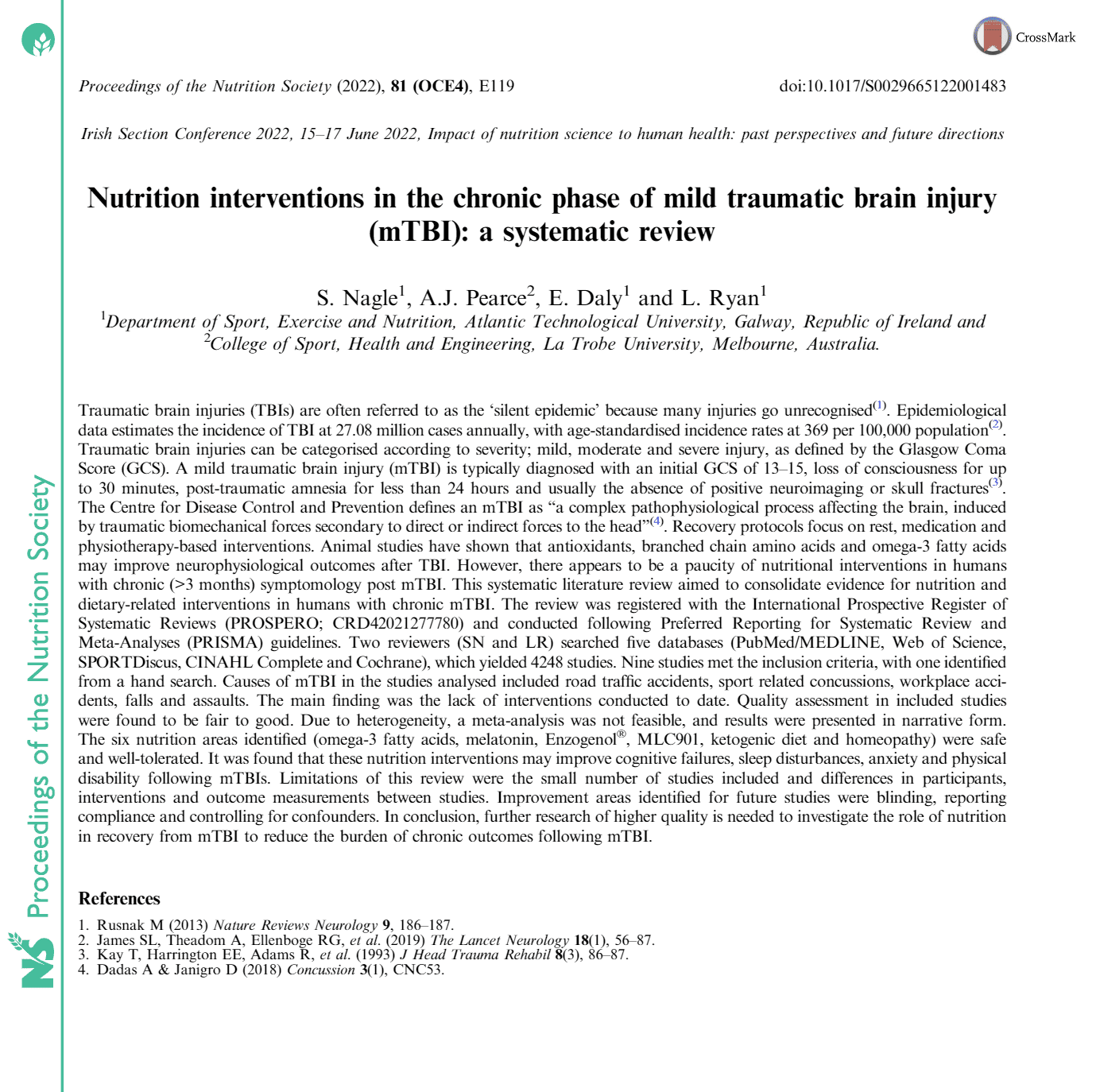S. Nagle1, A.J. Pearce2, E. Daly1 and L. Ryan1
- 1Department of Sport, Exercise and Nutrition, Atlantic Technological University, Galway, Republic of Ireland
- 2College of Sport, Health and Engineering, La Trobe University, Melbourne, Australia.
Abstract
Traumatic brain injuries (TBIs) are often referred to as the ‘silent epidemic’ because many injuries go unrecognised(1). Epidemiological data estimates the incidence of TBI at 27.08 million cases annually, with age-standardised incidence rates at 369 per 100,000 population (2).
Traumatic brain injuries can be categorised according to severity; mild, moderate and severe injury, as defined by the Glasgow Coma Score (GCS). A mild traumatic brain injury (mTBI) is typically diagnosed with an initial GCS of 13–15, loss of consciousness for up to 30 minutes, post-traumatic amnesia for less than 24 hours and usually the absence of positive neuroimaging or skull fractures (3).
The Centre for Disease Control and Prevention defines an mTBI as “a complex pathophysiological process affecting the brain, induced by traumatic biomechanical forces secondary to direct or indirect forces to the head” (4). Recovery protocols focus on rest, medication and physiotherapy-based interventions. Animal studies have shown that antioxidants, branched chain amino acids and omega-3 fatty acids
may improve neurophysiological outcomes after TBI. However, there appears to be a paucity of nutritional interventions in humans with chronic (>3 months) symptomology post mTBI.
This systematic literature review aimed to consolidate evidence for nutrition and dietary-related interventions in humans with chronic mTBI. The review was registered with the International Prospective Register of Systematic Reviews (PROSPERO; CRD42021277780) and conducted following Preferred Reporting for Systematic Review and Meta-Analyses (PRISMA) guidelines. Two reviewers (SN and LR) searched five databases (PubMed/MEDLINE, Web of Science, SPORTDiscus, CINAHL Complete and Cochrane), which yielded 4248 studies. Nine studies met the inclusion criteria, with one identified from a hand search. Causes of mTBI in the studies analysed included road traffic accidents, sport related concussions, workplace accidents, falls and assaults.
The main finding was the lack of interventions conducted to date. Quality assessment in included studies were found to be fair to good. Due to heterogeneity, a meta-analysis was not feasible, and results were presented in narrative form. The six nutrition areas identified (omega-3 fatty acids, melatonin, Enzogenol®, MLC901, ketogenic diet and homeopathy) were safe and well-tolerated. It was found that these nutrition interventions may improve cognitive failures, sleep disturbances, anxiety and physical disability following mTBIs.
Limitations of this review were the small number of studies included and differences in participants, interventions and outcome measurements between studies. Improvement areas identified for future studies were blinding, reporting compliance and controlling for confounders.
In conclusion, further research of higher quality is needed to investigate the role of nutrition in recovery from mTBI to reduce the burden of chronic outcomes following mTBI.
Proceedings of the Nutrition Society , Volume 81 , Issue OCE4: Irish Section Conference 2022, 15–17 June 2022, Impact of nutrition science to human health: past perspectives and future directions, 2022 , E119.
Link: https://doi.org/10.1017/S0029665122001483[Opens in a new window]


